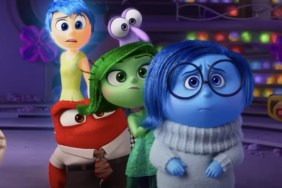CS sits down with Little Sister director Zach Clark
Our favorite film out of last year’s Fantasia Fest (and one of our favorite films of 2016, period) was director Zach Clark’s goth nun family dramedy Little Sister (Read our review here!). Despite earning rave reviews (95% on Rotten Tomatoes), the film flew under the radar of most moviegoers, but now that Kino Lorber has put out an incredible, extras-packed Blu-ray and the film has also become available on Netflix, it seemed like the perfect time to post our exclusive 1-on-1 with the Little Sister director. Clark previously made a mark with films like White Reindeer and Modern Love Is Automatic. We talk about some of the things he had to do to pull together a small, quirky movie like this, and it’s a must-read for all indie film lovers (and makers) out there!
Click here to purchase Little Sister on Kino Lorber Blu-ray!
It’s October, 2008. Young nun Colleen (Addison Timlin) is avoiding all contact from her family, until an email from her mother announces, “Your brother is home.” On returning to her childhood home in Asheville, NC, she finds her old room exactly how she left it: painted black and covered in goth/metal posters. Her parents (Ally Sheedy and Peter Hedges) are happy enough to see her, but unease and awkwardness abounds. Her brother (Keith Poulson) is living as a recluse in the guesthouse since returning home from the Iraq war. During Colleen’s visit, tensions rise and fall with a little help from Halloween, pot cupcakes, and GWAR. Little Sister is a sad comedy about family – a schmaltz-free, pathos-drenched, feel good movie for the little goth girl inside us all.
RELATED: Barbara Crampton on Little Sister, Re-Animator & More
ComingSoon.net: Were there any specific stylistic things you were trying to achieve?
Zach Clark: Everything in New York is static, and when she gets out the car in North Carolina it goes handheld. It stays handheld until the first time she goes to Emily’s house. Then when she goes back to the house it goes back to handheld… Basically the camera stabilizes as her relationships stabilize. I’m a big believer in having big overreaching artistic…
CS: Like a methodology?
Clark: Right, but not across films, per se. That’s not how I shot other movies.
CS: Well this is a story about family instability, so that makes sense.
Clark: Totally. So I’m just thinking of ways the camera can articulate those things. Even the way certain characters are framed throughout the film has a certain ethos to it. There’s only one shot that frames Colleen and her mother together, at the end. It’s the only shot in the movie of just those two characters together, not counting the three-shot of her praying.

CS: Was this film very scripted?
Clark: Yes, in the sense that the film had a script and all the actors said the words from it. I don’t think there’s any improv in the movie. I’ve used improve as a rehearsal tool before, but not on this movie. Ally, is so to the script that she would ask to change words, like “I want to lose this one sentence.” That was fine, that helps me, of course. The filmmakers I grew up admiring all very like, “This is my script, let’s stick to it.”
CS: Like who?
Clark: Like John Waters. No one’s more scripted than he is. The preciseness of that dialogue. Fassbender too. All the writer/directors. Not to discredit the other method, it’s just not how I worked.
CS: Well even without the improv the film feels very naturalistic, it never feels too arch.
Clark: Part of it too is just a vibe you create on set. We had a very small crew. Most of the movie takes place in that one house, and it’s our producer’s parent’s house. There are no rooms in that house that you don’t see in the movie. Melodie, who’s our producer, and Daryl who’s our cinematographer and co-producer, and myself, our associate producer Alston and our costume designer all lived in that house while we were making the movie. It’s also creating an intimate vibe. So many of the people that worked on this movie worked on the three movies we made before this.
CS: So there was a shorthand?
Clark: There was a shorthand, and we feel like a little family and kind of are. Bringing people into that vibe it’s very natural for people to feel comfortable. The cast is also contained and small.

CS: It was less than $1 million, right?
Clark: Yes. Yes. Definitely less than a million. (laughs) For these things it’s almost unfair… there’s so much that we have in the film that we didn’t have to pay for because we’re calling in favors, and there’s people who should and do get paid significantly more to work on other projects than we paid them on this. If we were doing this the way bigger productions are done we could have easily spent a lot more money, but we didn’t. It’s unfair to quantify it on an exact dollar amount, because that doesn’t include all the favors.
CS: Did you change the script to meet your circumstances?
Clark: I wrote the script knowing the house. I saw the house first, then wrote the script. Everything I was writing was location specific. The family’s house I knew, the herb farm their friends have was written for where Emily the friend lives.
CS: Did you ever have that moment where you thought the whole thing might fall apart? That tends to happen on smaller films like this a lot.
Clark: Of course! I’d never made a movie that cost this much before, but a small budget relatively to other movies. There’s so many other factors that get rolled into that which make the thing super fragile. Up until the first day when everyone was there in costumes and we were pointing cameras at them and they were saying words, I was like, “Oh cool, we’re making it!” It took us about two years to put the movie together, to get all the resources to actually do it. In those two years there were ebbs and flows of it looking possible and not possible.
CS: Were there stars that dropped out?
Clark: Yeah, we lost a couple people for various reasons. I’m not gonna say who…
CS: Goddamn you, Tom Cruise!
Clark: (laughs) Well I thought Addison did a better job than he would have! No, it really ended up being in our favor, and any time that happened it worked out for us. It’s a testament to how good Melodie is as a producer that every piece of news that seemed like it would be a disaster was turned into a better situation because of her hard work and pulling miracles out of thin air.

CS: What a lot of people don’t get about indie movies is yeah, you hear about actors being prima donnas and picking fights and stuff, but on a small movie if you have a crappy AD or even one bad crew member it can screw up the whole flow of everything.
Clark: 100%. Also, the movies are so strange and intimate in their own weird way that you have to have a positive, welcoming, comfortable vibe on set. The way to do that is to hire really nice people who are really good at their jobs, then everyone feels super safe and super comfortable. I feel like that is how we get people’s best work across the board. They want to do good work, they don’t have to worry about going to work and having to deal with this person…. Everyone’s happy to be there.
CS: Your lead actress, Addison Timlin, got to spend time with the other actors she was working with?
Clark: Yeah. Keith Poulson, who plays the brother, came out to set while we were shooting in New York at the convent. He and Addison hung out. Keith and Kristin Slaysman spent some time together. Ally we all met when she came to North Caroline. I’d talk to her on the phone before that, but the first time any of us met Ally face-to-face was when she got off the plane in Ashville. Peter Hedges [director of “Dan in Real Life”] was the first person we ever attached.
CS: This is his first big acting role?
Clark: Yes. His big screen debut! He never really gave me advice, it was always just a thumbs up, “Doing a great job!” I have never really paid my rent directing movies. In the past few years I started editing features for other filmmakers as well. It’s more liberating, as someone who makes their own movies, to not have the responsibility of being the director of a thing, and I also understands what that person needs which is someone to support them making their movie the way they want it to be made. Peter, as a director, understands. He never imposed. He was there to make my movie.
CS: Did this make you feel like you could comfortably transition into bigger features after this?
Clark: Yeah. I’ve been lucky in that every one has been a step up from the previous one, and that feels like a super smart trajectory to be on. I would feel comfortable having the next movie cost three-to-four times the amount that we spent on this movie. I’m not gonna turn any offers down (laughs), but I don’t necessarily think they’re gonna come my way super quickly. I don’t know if I would 100% know what to do on a $100 million dollar movie. I also don’t know if any ideas I have for movies would be worth spending $100 million dollars on. I’m used to waking up and making sure craft services are put out and adjusting props. Pre-production to me is being on eBay and finding the set dressing and props that I want. The bigger the budget gets the more you have people doing those things for you.









